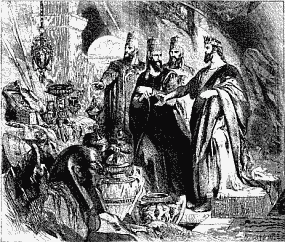There are times when I think Jesus’ spitting on the ground and smearing the resulting mud over the blind man’s eyes gave too many Christians a supposed license to be weirdos in church on Sunday.
I’m not saying Jesus was out of bounds (He enjoyed perfect communion with the Father, remember), only that I wish more Christians showed wisdom in how they dealt with others.
So a guy comes up for healing prayer and is told to lie down while the people stack Bibles on him and then walk around him seven times while chanting. Did the Holy Spirit really direct the people praying to do this? REALLY? And was that direction verified, not only beforehand by checking with the elders but also by noting whether such an odd means of dealing with the problem actually resulted in a positive outcome?
Spiritual abuse has many forms. From bizarre charismania passed off as ministry to the cult of personality favored by some church leader “celebrities,” one can find some type of spiritual abuse in nearly every church. It’s just that most churches and the people in them are often too timid to point out their own failings. And the beat goes on…
While it may be easy for outsiders to walk into a church and immediately notice what might be “off,” people are far better at noticing a present problem than recognizing what is absent.
The issue for us as Christians today is what might be absent may form a more egregious example of spiritual abuse than the presence of any obviously bizarre practice.
Over at Church A, everyone talks about finding freedom in Christ (present) but no one ever talks about the perseverance of the saints (absent). Likewise, at the Church B, the talk is always that the shed blood of Christ on the cross bought healing from sin (present), but no one ever hears the blood and cross bought us healing from physical illness and disease (absent).
At Church A, the people there live in constant fear of losing their salvation. At Church B, people wrongly make peace with their physical sufferings and never take hold of the healing Christ bought them.
When we do not preach the whole Gospel to the whole man, are we not perpetrating spiritual abuse?
I’ve long been a fan of Leonard Ravenhill, the British revivalist. One of his consistent jabs was to call denominations “abominations” and then “correct” himself, as if he’d made a slip of the tongue. Let the nervous tittering commence.
When you get to the heart of this issue, though, the truth hurts, and I think that Ravenhill was closer to the truth regarding denominations than some think.
I enjoy musical theater, and one of my favorite musicals is South Pacific. The theme of that musical concerns racism and its devastating warping of people’s thoughts. The highlight song of that theme is “You’ve Got to Be Carefully Taught” (see video).
The problem with denominationalism and the conformance to one ingrained “brand” of Christianity over another is that such adherence not only teaches through the presence of ideas, it also teaches by absence. You’ve got to be carefully taught, and in many cases what is not taught is as important as what is. And it is the absent teaching that most often rattles people when they encounter other Christians who are content with a valid, present theological concept the “lackees” have never heard (or have been told doesn’t matter). More divisiveness enters the Church for this reason than any other.
If we are not preaching and teaching the entirety of the Gospel, if we pick and choose our theology so as to create doctrinal silence here and there, then it is likely that we are spiritually abusing those charged to our care.

